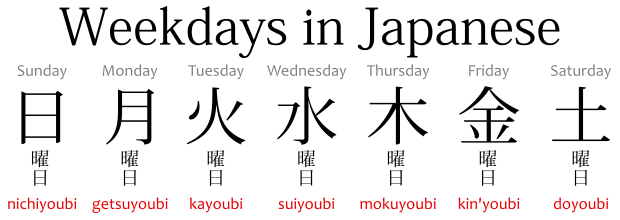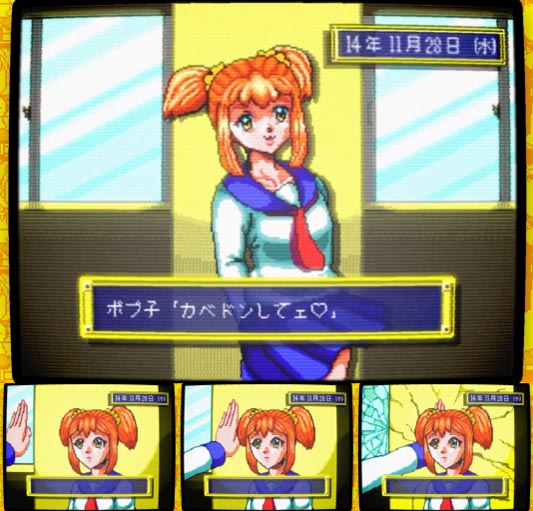In Japan, a week has seven days just like everywhere else in the world (probably). For reference, this is what the weekdays are called in Japanese:
| Weekday | kanji | romaji |
|---|---|---|
| Sunday | 日曜日 | nichiyoubi |
| Monday | 月曜日 | getsuyoubi |
| Tuesday | 火曜日 | kayoubi |
| Wednesday | 水曜日 | suiyoubi |
| Thursday | 木曜日 | mokuyoubi |
| Friday | 金曜日 | kin'youbi |
| Saturday | 土曜日 | doyoubi |
Morphology
The words for weekdays are formed by multiple morphemes: the ~youbi ~曜日 suffix that means "weekday" plus a single-kanji morpheme that names that weekday.
Notably, in the word for Sunday, nichiyoubi 日曜日, you have the 日 kanji twice, but with different readings. The nichi 日 reading is an on'yomi 音読み reading which names the weekday, while the ~bi ~日 reading is a kun'yomi 訓読み that's part of the ~youbi suffix.
First Kanji Meaning
The meaning of the first kanji of each weekday appears to be random, but the weekdays are actually named after the seven celestial bodies visible to the naked eye: five "planets," wakusei 惑星, plus the Sun and the Moon.(sendai-astro.jp) Observe:
| Single-kanji word. | Celestial Body |
|---|---|
| nichi 日 Day. |
hi (taiyou) 日(太陽) Sun. |
| getsu 月 Month. |
tsuki 月 Moon. |
| hi 火 Fire. |
kasei 火星 Mars. |
| mizu 水 Water. |
suisei 水星 Mercury. |
| ki 木 Tree. |
mokusei 木星 Jupiter. |
| kin 金 Gold. |
kinsei 金星 Venus. |
| tsuchi 土 Soil. |
dosei 土星 Saturn. |
Basically humans could see these seven celestial bodies, called shichiyuu 七雄, which they considered to be deities, and they could figure out that a single moon phase lasted seven days, so they imagined each weekday was ruled over by a different space-god, and that's where their names come from.
Finally, you may be wondering why are the planets named like this in Japanese. Why is Jupiter "tree"?
The names of the planets in Japanese come from the Chinese Wuxing (five phases, or "five elements"), which would be fire, water, wood, metal (gold), and earth (soil).(eco.mtk.nao.ac.jp:曜日の名前)
By the way, something similar occurs in English: in imperial Rome, the days of the week were named after the planets, which in turn were named after the roman gods, when these weekday names were borrowed, the Roman god's name was replaced by a comparable Germanic god's name, except for Saturday, which retained its original Roman name.(english.stackexchange.com, citing the Oxford English Dictionary) Observe:
| Weekday | Old English | Latin |
|---|---|---|
| Sunday | Sunnandæg Day of Sun. |
dies Solis Day of Sol. |
| Monday | Mōnandæg. Day of Moon. |
dies Lunae Day of Luna. |
| Tuesday | Tīwesdæg Day of Tīw |
dies Martis Day of Mars. |
| Wednesday | Wōdnesdæg Day of Odin |
dies Mercurii Day of Mercury. |
| Thursday | Thunresdæg Day of Thunder. Day of Thor. |
dies Jovis Day of Jove. Day of Iupiter. |
| Friday | Frīgedæg Day of Frigga. |
dies Veneris Day of Venus. |
| Saturday | Sæternesdæg Day of Saturnus. |
dies Saturni Day of Saturnus. |
Mnemonics
If you're having trouble remembering the names of weekdays in Japanese, here are some simple mnemonics:
- Sunday is nichi 日 just like hi 日 is "Sun."
- Moon, tsuki 月, comes after the Sun, i.e. getsuyoubi after nichiyoubi, so getsuyoubi is Monday
- Fire comes before water—kayoubi, suiyoubi.
I don't have a mnemonic for the rest, but you'll probably memorize the names for the Friday and Saturday rather quickly considering they're at the end of the week, so the only thing left will be Thursday. You could try to pretend it's Tree's Day or something to remember it, I guess.
Usage
Every weekday word works as a temporal adverb. They can be used by themselves or followed by the ni に particle.
- kin'youbi suizokukan ni ikimashita
金曜日水族館に行きました
Friday, [I] went to the aquarium. - kin'youbi ni suizokukan ni ikimashita
金曜日に水族館に行きました
They can also be used as nouns:
- mokuyoubi wa nan'nichi desu ka?
木曜日は何日ですか?
Thursday is what day [of the month]? - mokuyoubi wa ni-juu-ichi-nichi desu
木曜日は21日です
Thursday is the 21st.
Abbreviations
The names for weekdays are often used in abbreviated form. Every weekday, which ends in ~youbi, may be abbreviated so that the ~bi ending is removed and it ends in ~you, or so that the whole ~youbi part is removed. In English something similar occurs, there being a 3-letter representation for every weekday. Observe:
| Weekday | Minus ~bi | Minus ~youbi |
|---|---|---|
| Sunday SUN |
nichiyou 日曜 |
nichi 日 |
| Monday MON |
getsuyou 月曜 |
getsu 月 |
| Tuesday TUE |
kayou 火曜 |
ka 火 |
| Wednesday WED |
suiyou 水曜 |
sui 水 |
| Thursday THU |
mokuyou 木曜 |
moku 木 |
| Friday FRI |
kin'you 金曜 |
kin 金 |
| Saturday SAT |
doyou 土曜 |
do 土 |
Generally the entire ~youbi isn't dropped except for specific contexts where it's obvious it's supposed to be a weekday. Dropping the ~bi, however, is rather common.
- kin'you suizokukan ni ikimashita
金曜水族館に行きました
Multiple Weekdays
Sometimes, multiple weekdays may be referred to all at once in single-kanji abbreviated form, sometimes separated by a middle dot (・) in writing, followed by a single ~youbi, like this:
- ka, sui-youbi
火・水曜日
Tuesday and Wednesday.
Tuesday or Wednesday. - kin, do, nichi-youbi
金・土・日曜日
Friday, Saturday, and Sunday.
Friday, Saturday, or Sunday.
Between Parentheses in Dates
Sometimes when a date is written in Japanese the single-kanji representation of a weekday is written between parentheses at the end, e.g. (土) after a date means it's a doyoubi 土曜日, "Saturday." It's like if (SAT) for Saturday were written.
See also: Japanese Date Format.
A Day's Weekday
The word youbi 曜日 can be used alone to mean the "weekday" of something. For example:
- Context: explaining what a device or computer program does.
- kyou no youbi wo hyouji suru
今日の曜日は表示する
[It] displays today's weekday. - Context: talking about a day in the future when something happen.
- {dono youbi ni} naru ka wakaranai
どの曜日になるかわからない
[I] don't know {what weekday} [it] will be.- What weekday it will land on.
What Weekday?
To say "what weekday" in Japanese there are two ways:
- dono youbi
どの曜日
What weekday. Which weekday of the seven. - nan'youbi
何曜日
What weekday.
For example:
- kyou wa nan'youbi desu ka?
今日は何曜日ですか?
What weekday is today? - mokuyoubi desu
木曜日です
It's Thursday. - teikyuubi wo {nan'youbi ni} suru?
定休日を何曜日にする
[You] will make the closing day what weekday?- teikyuubi - literally "fixed rest day," in the sense of a day when a store closes that occurs at fixed, regular intervals, e.g. every Sunday.
Weekend
The terms to refer the weekend and days off would be:
- shuumatsu
週末
Weekend. - shuusho
週初
Weekstart. - kyuujitsu
休日
Day off. (e.g. the weekend.) - heijitsu
平日
"Ordinary day." A non-holiday. A day in which you work.
In English, sometimes a day that isn't in the weekend is called a "weekday." In this case, "weekdays" would likely translate to heijitsu, because it's in the sense of a day when you work, as opposed to the weekend when you have the day off.
Specifying The Week
Sometimes it's not enough to specify the weekday, it's also necessary to specify which week we're talking about. There are multiple ways to do this.
Deitic
We can refer to a week or weekday relative to today like this:
- konshuu
今週
This week.- konshuumatsu
今週末
This weekend. - konshuu no kayoubi
今週の火曜日
This week's Tuesday.
- konshuumatsu
- tsugi no kayoubi
次の火曜日
Next Tuesday. - kondo no kayoubi
今度の火曜日 - raishuu
来週
Next week.- raishuumatsu
来週末
Next weekend. - raishuu no kayoubi
来週の火曜日
Next week's Tuesday.
- raishuumatsu
- kono mae no kayoubi
この前の火曜日
The Tuesday before this. (literally.)
Last Tuesday. - senshuu
先週
Previous week.- senshuumatsu
先週末
Previous weekend. - senshuu no kayoubi
先週の火曜日
Previous week's Tuesday.
- senshuumatsu
For non-immediate weeks:
- isshukan-mae no kayoubi
1週間前の火曜日
The Tuesday of one week ago. (previous week's.) - nishuukan-mae no kayoubi
2週間前の火曜日
The Tuesday of two weeks ago. (the week before the previous.) - sanshuukan-mae no kayoubi
3週間前の火曜日
The Tuesday of three weeks ago. - ishuukan-go no kayoubi
1週間後の火曜日
The Tuesday of one week later. (next week's.) - nishuukan-go no kayoubi
2週間後の火曜日
The Tuesday of two weeks later. (the week after the next.) - sanshuukan go no kayoubi
3週間後の火曜日
The Tuesday of three weeks later.
Ordinal
We can refer to the nth weekday of a month by using dai~ 第~ followed by a number (ichi, ni, san) followed by the weekday, like this:
- san-gatsu dai ichi kayoubi
3月第1火曜日
The first Tuesday of March. - san-gatsu dai ni kayoubi
3月第2火曜日
The second Tuesday of March. - san-gatsu dai san kayoubi
3月第3火曜日
The third Tuesday of March. - san-gatsu dai yon kayoubi
3月第4火曜日
The fourth Tuesday of March.
References
- 曜日はどうやって決まったの? - sendai-astro.jp, accessed 2022-07-25.
- Why is “Saturday” Romanic? - english.stackexchange.com, accessed 2022-07-25.
- 曜日の名前 - eco.mtk.nao.ac.jp, accessed 2022-07-25.


Overall a good article, but not all of our English days are named after the Roman gods. Thursday, for example, stems from Thor's day and Wednesday stems from Woden's day. And Sunday isn't really named after a god, just after the Sun.
ReplyDeleteGood point, I didn't know that. I saw that some of them were and I just assumed they all were. Thanks.
DeleteAh.... sort of.... close but not 100% accurate. Your’re quite right, Wednesday & Thursday are named after Woden and Thor... but they are both Norse gods and have nothing to do with Rome... Saturday named after Saturn is a Roman god. I can’t remember about Monday, Tuesday or Sunday. I think Friday was after Freya Norse goddess of fire and other stuff, but I would put my head on the chopping block over it.
ReplyDeleteOn another note... loving this site...like the content, like the discussion.
Cheers TimC
"And before you say it I know the Moon and the Sun are not planets"
ReplyDeleteYou wouldn't believe how many people don't know that.